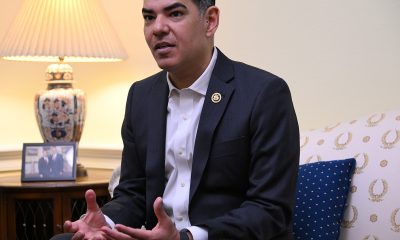National
Will Dems embrace marriage in platform?
Renewed debate over LGBT issues as parties prepare for 2012 conventions

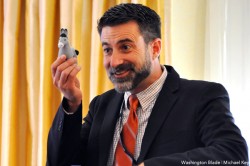
Im sure that the Democratic Party platform will be very good if not great on LGBT issues,' said Michael Mitchell, executive director of the National Stonewall Democrats. (Washington Blade file photo by Michael Key)
The Republican National Convention in Tampa Bay, Fla., and the Democratic National Convention in Charlotte, N.C., are 13 months away, but many are already wondering how the two parties will address LGBT issues in their 2012 platforms.
“The platform from 2008 was a pretty good platform, as are most of the platforms of state Democratic parties around the country,” said Michael Mitchell, executive director of the National Stonewall Democrats. “So the vast majority of them are very LGBT inclusive, the vast majority of them talk about everything from the repeal of ‘Don’t Ask, Don’t Tell,’ all the way up to and including marriage in some places. Certainly they vary state to state, given how strong LGBT people are organized in the Democratic Party there.”
Mitchell continued, “So I have no doubt given the people who were involved in 2008 will continue to be involved now, the new crop of people we have coming in. The work that we’re doing at National Stonewall — or rather that we will be doing, as we haven’t started working in earnest on a platform — I’m sure that the platform will be very good if not great on LGBT issues.”
Mitchell sees opportunities to address new LGBT issues in the platform, as several of the 2008 planks have been achieved, including passage of a federal hate crimes law and repeal of “Don’t Ask, Don’t Tell.”
“Our issues have shifted since 2008, so obviously we had the repeal of ‘Don’t Ask, Don’t Tell’ and that’s great … but there are other issues around that implementation that we have to start digging into,” Mitchell continued. “I think it’s certainly better than what the other party is up to.”
The 2008 Republican Party platform denounced same-sex marriage, as well as non-discrimination statutes barring bias on the basis of sexual orientation or gender identity in areas like employment, public accommodations and adoption.
Some moderate Republicans hope that the party will soften its anti-gay rhetoric next year, as public opinion on LGBT issues has shifted.
The DNC’s 2008 platform included a call to repeal “Don’t Ask, Don’t Tell,” increase funding for HIV/AIDS prevention and care, pass the Local Law Enforcement Hate Crimes Prevention Act and assure that federal funds would not be used to “proselytize or discriminate” in “faith-based” programs. The language also explicitly promised to fight discrimination based on sexual orientation and gender identity, and alluded to support for non-discrimination laws in employment.
Most strikingly, the platform stated, “We support the full inclusion of all families, including same-sex couples, in the life of our nation, and support equal responsibility, benefits, and protections. We will enact a comprehensive bipartisan employment non-discrimination act. We oppose the Defense of Marriage Act and all attempts to use this issue to divide us.”
But some LGBT Democrats are looking for more in 2012.
Richard Socarides, president of Equality Matters and a former adviser to President Bill Clinton, wants to see the Democratic Party take a bold stance on issues dear to the LGBT community, including marriage equality.
“I feel it’s important for the Democratic Party to have a strong pro-LGBT platform,” he said. “The platform is very important. It reflects what we stand for. The 2008 platform is not going to be good enough for 2012.
“As we watch the Republican field develop, it seems the GOP platform will be a total disaster,” Socarides said, referring to the 2012 field of GOP presidential candidates.
Members of both parties, however, see 2012 as an opportunity to make headway.
“Log Cabin Republicans plan to actively participate in the process to revise the party’s platform,” said Christian Berle, deputy executive director of Log Cabin Republicans. “We recognize there will be a lot of work to be done to strengthen the importance of reaching out to LGBT Americans as a part of strengthening the party,”
Log Cabin’s chairman emeritus, Bob Kabel, sits on the Republican National Committee, Berle noted. Kabel — Log Cabin’s first national chairman — is the only openly gay member of the RNC, and the first openly gay chairman of a state-level Republican Committee, as the chairman of the District of Columbia Republican Committee.
“Log Cabin Republicans have long had delegates of ours to the conventions and will work with other organizations to help us recruit more openly gay candidates,” Berle said.
Mitchell hopes to bring leaders from across the LGBT community directly to the DNC to communicate goals and ideas to the decision makers.
“I would hope that we are the point organization for other LGBT organizations who are looking to get included in the platform and that we can help guide people to the right folks. That’s the role I really see us as playing.”
Though both parties have a long wait to decide their platforms, Michael Czin, a regional press secretary at the Democratic National Committee, said that as soon as the state parties are ready, the process will begin moving forward.
“The process to draft the 2012 platform hasn’t started yet, but next year there will be a robust and inclusive process within the Democratic Party to draft the 2012 platform,” Czin told the Blade. “The process, just like in previous years will be representative of the many voices that comprise the Democratic Party.”
The platform is forged by the Platform Committee, a diverse group that consists of party delegates from all over the country, representing many constituency groups within the party.
Mitchell said that Stonewall would be able to wield some influence over the process of crafting the platform, especially if prominent LGBT Democrats are involved at high levels during its creation.
“[Stonewall Democrats] have close relationships with the folks who I expect will end up being players,” Mitchell said. “The folks who were all involved the last time around. … We have a lot of those relationships already existing, and I’m sure we’ll be building relationships to figure out the best way to make the platform as LGBT inclusive as possible for both the LGBT community and our families.”
Berle sees a trend of Republican candidates taking less hard-right stances on LGBT issues.
“I think the candidacy of Gov. Jon Huntsman opens a great number of doors for LGBT Republicans to get behind a candidate,” Berle told the Blade. “He has the same position on marriage equality that the president does with his support for civil unions, that is striking a tenor with a wide array of gay and lesbian Americans, not only Republicans but Democrats and independents as well. You have an openly gay candidate in Fred Karger and you have Gov. Gary Johnson and Rep. Ron Paul, whose libertarian positions line up with the views of many LGBT Americans.”
But not everyone sees platform language as relevant to the race, as candidates don’t always tow the party line.
“Party platforms are interesting creatures these days,” said Dana Beyer, executive director of Gender Rights Maryland. “There’s a real dichotomy in my mind. I can’t remember the last time I cared, as a voter, what the platform actually said. Maybe the early 70’s, but it was so long ago I don’t recall.”
She continued, “However, as an activist, and a Democratic candidate, I’m very aware that the platform speaks volumes about the party’s values and priorities. And while it is still a long haul from the enunciation of those values in a platform to their integration into the life of the party’s members, and particularly its leaders, you must start somewhere, and that somewhere is the party platform.”
Chris Barron, board chair of GOProud, played down the importance of platform language.
“Political party platforms are not worth the paper that they’re printed on,” said Barron. “No one in the country reads them, nor should anyone in the country read them. They have absolutely no impact whatsoever. What I care about? I care about the policies that the nominee of each party is going to put forward. That’s what [GOProud will] be focused on.”
Log Cabin’s Berle agrees the presidential nominee holds more sway than the platform committee in the end.
“In terms of the platform — and the convention itself — it will be driven largely through whoever is the Republican nominee, so there are a varying number of candidates who would have different positions in regard to redressing those issues,” Berle said.
Berle speculated that if one of the candidates who has committed to supporting a federal marriage amendment wins the nomination, it will remain part of the platform. However, there are other areas where LGBT Republicans can gain ground, he said.
“It would be a consistent effort of ours to address and debate and hopefully remove the language in support of the ‘Don’t Ask, Don’t Tell’ policy as a part of the platform, particularly because ‘Don’t Ask, Don’t Tell’ in August of 2012 will not exist as a policy,” Berle said. “And it will not exist as a policy because of the support of Republican United States Senators such as Susan Collins and Scott Brown.”
Berle noted that there could be opportunities at the convention level that would expand rights for LGBT Americans, such as support for tax parity legislation that removes the penalty on companies and individuals that cover domestic partners through their health care policies.
When speculating about whether or not the Republican Party would finally nominate a candidate that would speak against anti-LGBT voices in the party, GOProud’s Barron said the party already had in John McCain.
“John McCain went to the floor of the Senate and spoke out eloquently against the Federal Marriage Amendment back when that voice actually mattered,” Barron said. “When there were centrist Democrats who were hiding from this issue, John McCain went to the floor and talked about how it is antithetical to everything that the Republican Party was founded on.”
McCain, however, frustrated his pro-LGBT friends in the Republican Party in 2010 when he became the most outspoken voice fighting the repeal of “Don’t Ask, Don’t Tell” in the Senate. The repeal eventually passed, despite the senator’s protests and filibuster threat.
“I’m confident that we’re going to have a nominee that gay conservatives can work with,” Barron said. “It’s very early in the process, but at the end of the day we’re going to have somebody that gay conservatives can support.”
The White House
USCIS announces it now only recognizes ‘two biological sexes’
Immigration agency announced it has implemented Trump executive order

U.S. Citizenship and Immigration Services on Wednesday announced it now only “recognizes two biological sexes, male and female.”
A press release notes this change to its policies is “consistent with” the “Defending Women from Gender Ideology Extremism and Restoring Biological Truth to the Federal Government” executive order that President Donald Trump signed shortly after he took office for the second time on Jan. 20.
“There are only two sexes — male and female,” said DHS spokesperson Tricia McLaughlin in a statement. “President Trump promised the American people a revolution of common sense, and that includes making sure that the policy of the U.S. government agrees with simple biological reality.”
“Proper management of our immigration system is a matter of national security, not a place to promote and coddle an ideology that permanently harms children and robs real women of their dignity, safety, and well-being,” she added.
The press release notes USCIS “considers a person’s sex as that which is generally evidenced on the birth certificate issued at or nearest to the time of birth.”
“If the birth certificate issued at or nearest to the time of birth indicates a sex other than male or female, USCIS will base the determination of sex on secondary evidence,” it reads.
The USCIS Policy Manuel defines “secondary evidence” as “evidence that may demonstrate a fact is more likely than not true, but the evidence does not derive from a primary, authoritative source.”
“Records maintained by religious or faith-based organizations showing that a person was divorced at a certain time are an example of secondary evidence of the divorce,” it says.
USCIS in its press release notes it “will not deny benefits solely because the benefit requestor did not properly indicate his or her sex.”
“This is a cruel and unnecessary policy that puts transgender, nonbinary, and intersex immigrants in danger,” said Immigration Equality Law and Policy Director Bridget Crawford on Wednesday. “The U.S. government is now forcing people to carry identity documents that do not reflect who they are, opening them up to increased discrimination, harassment, and violence. This policy does not just impact individuals — it affects their ability to travel, work, access healthcare, and live their lives authentically.”
“By denying trans people the right to self-select their gender, the government is making it harder for them to exist safely and with dignity,” added Crawford. “This is not about ‘common sense’—it is about erasing an entire community from the legal landscape. Transgender, nonbinary, and intersex people have always existed, and they deserve to have their identities fully recognized and respected. We will continue to fight for the rights of our clients and for the reversal of this discriminatory policy.”
Federal Government
Mass HHS layoffs include HIV/AIDS prevention, policy teams
Democratic states sue over cuts

Tuesday began a series of mass layoffs targeting staff, departments, and whole agencies within the U.S. Department of Health and Human Services under Secretary Robert F. Kennedy Jr., who reportedly plans to cut a total of 10,000 jobs.
On the chopping block, according to reports this week, is the Office of Infectious Disease and HIV/AIDS Policy. A fact sheet explaining on the restructuring says “a new Administration for a Healthy America (AHA) will consolidate the OASH, HRSA, SAMHSA, ATSDR, and NIOSH, so as to more efficiently coordinate chronic care and disease prevention programs and harmonize health resources to low-income Americans.”
The document indicates that “Divisions of AHA include Primary Care, Maternal and Child Health, Mental Health, Environmental Health, HIV/AIDS, and Workforce, with support of the U.S. Surgeon General and Policy team.”
“Today, the Trump administration eliminated the staff of several CDC HIV prevention offices, including entire offices conducting public health communication campaigns, modeling and behavioral surveillance, capacity building, and non-lab research,” said a press release Tuesday by the HIV + Hepatitis Policy Institute.
The organization also noted the “reassignments” of Jonathan Mermin, director of the National Center for HIV, Viral Hepatitis, STD, and TB Prevention, and Jeanne Marrazzo, director of the National Institutes of Health’s National Institute of Allergy and Infectious Diseases. Both were moved to the Indian Health Service.
“In a matter of just a couple days, we are losing our nation’s ability to prevent HIV,” said HIV + Hepatitis Policy Institute Executive Director Carl Schmid. “The expertise of the staff, along with their decades of leadership, has now been destroyed and cannot be replaced. We will feel the impacts of these decisions for years to come and it will certainly, sadly, translate into an increase in new HIV infections and higher medical costs.”
The group added, “We are still learning the full extent of the staff cuts and do not know how the administration’s announced reorganization of HHS will impact all HIV treatment, prevention, and research programs, including President Trump’s Ending the HIV Epidemic initiative,” but “At the moment, it seems that we are in the middle of a hurricane and just waiting for the next shoe to drop.”
A group of 500 HIV advocates announced a rally planned for Wednesday morning at 8 a.m., at the U.S. Capitol lawn across from the Cannon House Office Building, which aims to urge Congress to help stop the cuts at HHS.
“Over 500 advocates will rally on Capitol Hill and meet with members of Congress and Hill staff to advocate for maintaining a strong HIV response and detail the potential impact of cuts to and reorganization of HIV prevention and treatment programs,” the groups wrote.
The press release continued, “HHS has stated that it is seeking to cut 10,000 employees, among them 2,400 CDC employees, many doing critical HIV work. It also seeks to merge HIV treatment programming into a new agency raising concerns about maintaining resources for and achieving the outstanding outcomes of the Ryan White HIV/AIDS Program.”
On Tuesday a group of Democratic governors and attorneys general from 23 states and D.C. filed a lawsuit against HHS and Kennedy seeking a temporary restraining order and injunctive relief to halt the funding cuts.
U.S. Centers for Disease Control and Prevention withdrew approximately $11.4 billion in funding for state and community health departments during the COVID-19 pandemic response, along with $1 billion to the Substance Abuse and Mental Health Services Administration.
“Slashing this funding now will reverse our progress on the opioid crisis, throw our mental health systems into chaos, and leave hospitals struggling to care for patients,” New York Attorney General Letitia James said.
State Department
Former US envoy for global LGBTQ, intersex rights slams Trump
Former President Joe Biden appointed Jessica Stern in 2021
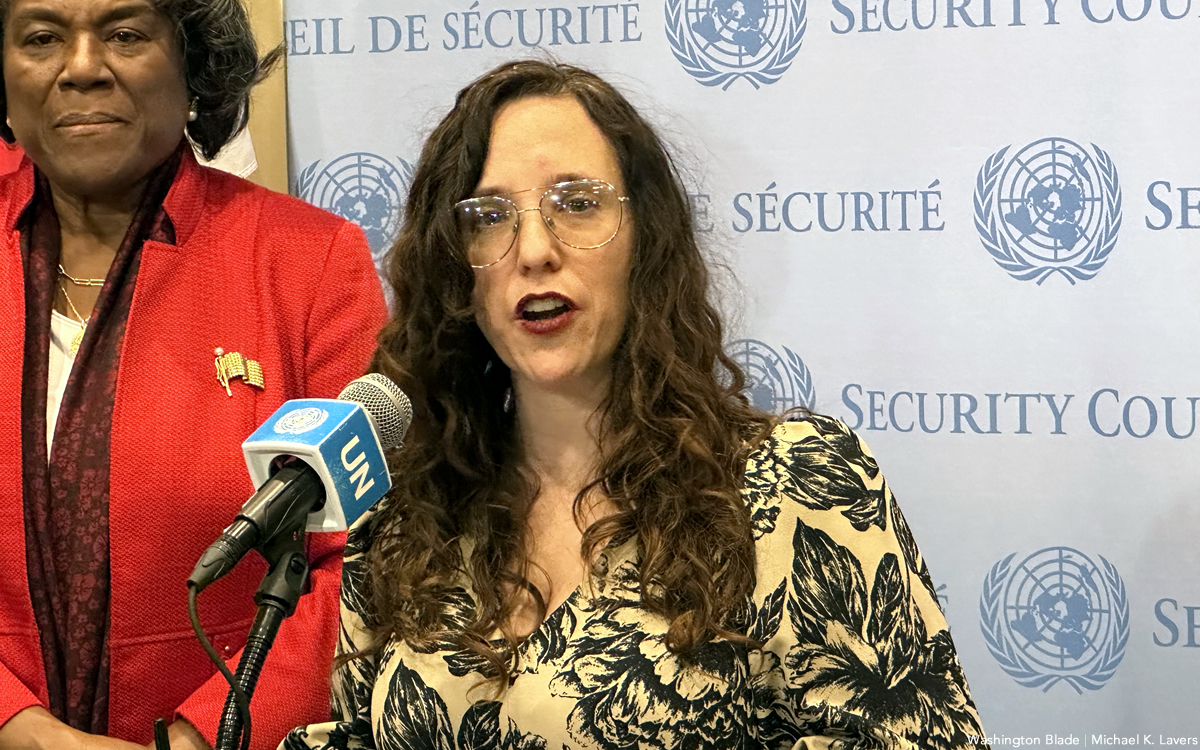
Jessica Stern, the former special U.S. envoy for the promotion of LGBTQ and intersex rights, says the work that she and her colleagues did under the Biden-Harris administration is “being systematically dismantled.”
“As the person who was responsible for leading U.S. foreign policy on LGBTQI+ issues, it’s been very difficult for the past two months to see that work being systematically dismantled,” she told the Washington Blade on March 19 during a telephone interview.
Stern was the executive director of Outright International, a global LGBTQ and intersex advocacy group, when then-President Joe Biden appointed her in June 2021.
The promotion of LGBTQ and intersex rights was a cornerstone of the Biden-Harris administration’s overall foreign policy. These efforts specifically included the decriminalization of consensual same-sex sexual relations and marriage equality efforts in countries where activists said they were possible through the legislative or judicial processes.
The Trump-Vance administration’s decision to freeze most U.S. foreign aid spending for at least 90 days has had a devastating impact on the global LGBTQ and intersex rights movement. President Donald Trump’s executive order that bans the State Department from issuing passports with “X” gender markers has prompted Germany and several other European countries to issue travel advisories for transgender and nonbinary people who are planning to visit the U.S.
Stern said the Trump-Vance administration “has studied the anti-LGBTQI strategies of other countries and basically imported the worst ideas from around the world: The most violent, the most dehumanizing, the most targeting strategies.” Stern added these policies have emboldened Hungarian Prime Minister Viktor Orbán, Russian President Vladimir Putin, Argentine President Javier Milei and other anti-LGBTQ heads of state.
“It’s one thing when a small country that has limited global reach implements anti-LGBTQI laws and policies. It’s another thing when one of the world’s superpowers does so,” Stern told the Blade. “There’s no question that the U.S.’s regression on LGBTQI rights is actually going to accelerate backlash against LGBTQI people around the world.”
“We provide political legitimacy to those ideas, but also we’re forging new alliances and coalitions, and we’re pushing these ideas on other countries,” she added. “So, it’s not a passive action. The U.S. government currently is actively funding and disseminating anti-LGBTQI hatred around the world.”
Former State Department colleagues ‘afraid every day’
The Trump-Vance administration in a Feb. 3 statement that defended its efforts to dismantle the U.S. Agency for International Development noted examples of the organization’s “waste and abuse” included $2 million for “sex changes and ‘LGBT activism'” in Guatemala and $1.5 million to “advance diversity, equity and inclusion in Serbia’s workplaces and business communities.” Secretary of State Marco Rubio last month said 83 percent of USAID contracts have been cancelled, and the remaining will “now be administered more effectively under the State Department.”
Rubio after the Trump-Vance administration froze nearly all U.S. foreign aid spending issued a waiver that allowed the President’s Emergency Plan for AIDS Relief and other “life-saving humanitarian assistance” programs to continue to operate.
The Blade has previously reported PEPFAR-funded programs in Kenya, South Africa, and elsewhere have suspended services and even shut down because of a lack of U.S. funding. UNAIDS Executive Director Winnie Byanyima on March 24 said 6.3 million more people around the world will die of AIDS-related complications over the next four years if the U.S. does not fully restore its foreign assistance.
Stern said her former State Department colleagues are “afraid every day.”
“They never know, ‘Am I going to be fired today?’ “Am I going to be put on administrative leave?’,” she said. “I cannot even imagine what it’s like to go to work every day.”
Stern told the Blade her former colleagues tell her that “there’s not a lot of foreign policy work happening because there’s so much disruption being caused by DOGE (the Department of Government Efficiency).”
“Entire departments have been decimated,” she said, noting one of them has lost 60 people. “It’s almost inconceivable to figure out how to restructure your work when your resources have been decimated.”
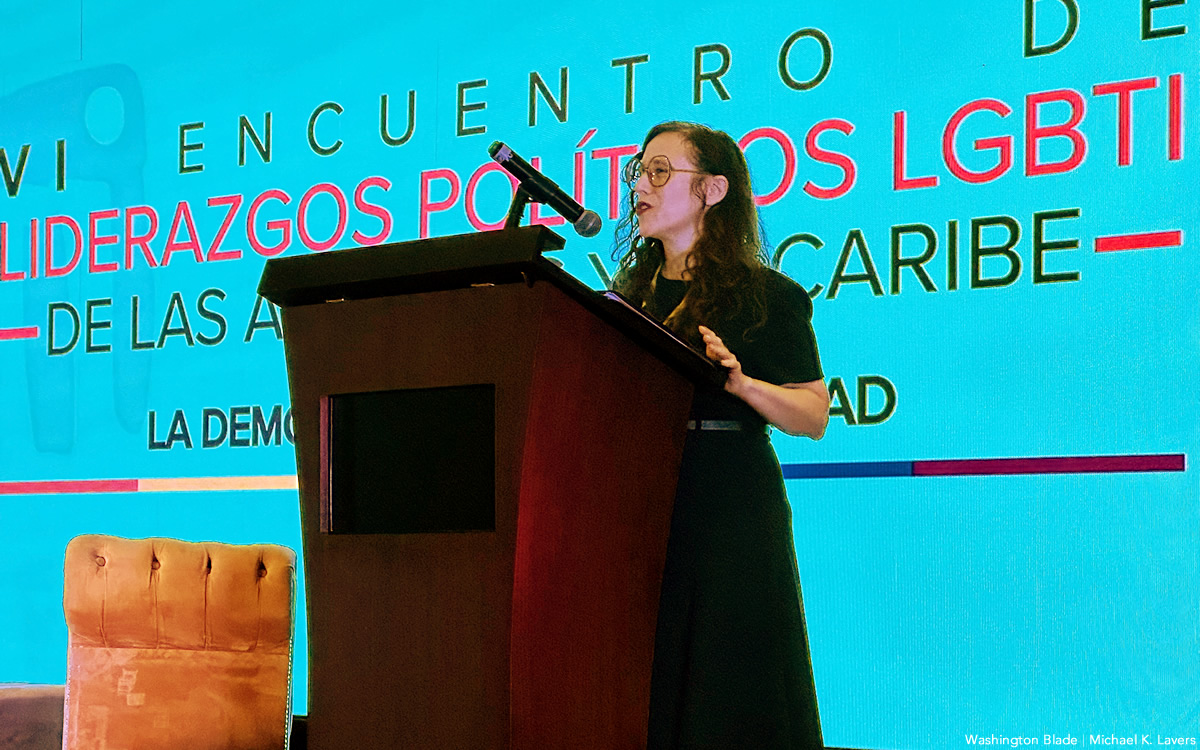
Stern described herself as “an eternal optimist” when the Blade asked whether she thinks the U.S. can ever stand for LGBTQ and intersex rights abroad.
“You have to believe in human rights,” she said.
Stern said former Secretary of State Antony Blinken as “an ally on LGBTQI issues.” Stern also said many of her now former State Department colleagues thanked her and her team for their work before they left government.
“There’s so much compassion from straight and cisgendered allies, from career officials, people that are not human rights experts or specialists, people that don’t focus on the well-being of LGBTQI people, but people that care very much about the United States standing for its values, the rule of law, equality for all, and this notion that it is in our national interest to ensure that there is safety, prosperity, and well-being for people around the world,” she said.
“The situation we find ourselves in will not last forever,” added Stern. “What we have to do is figure out how to hold the line right now, and how to organize for the future.”
She stressed ways to “hold the line” include litigation, protests, letters-to-the-editor, demanding accountability from lawmakers.
“There’s so much to do,” said Stern.
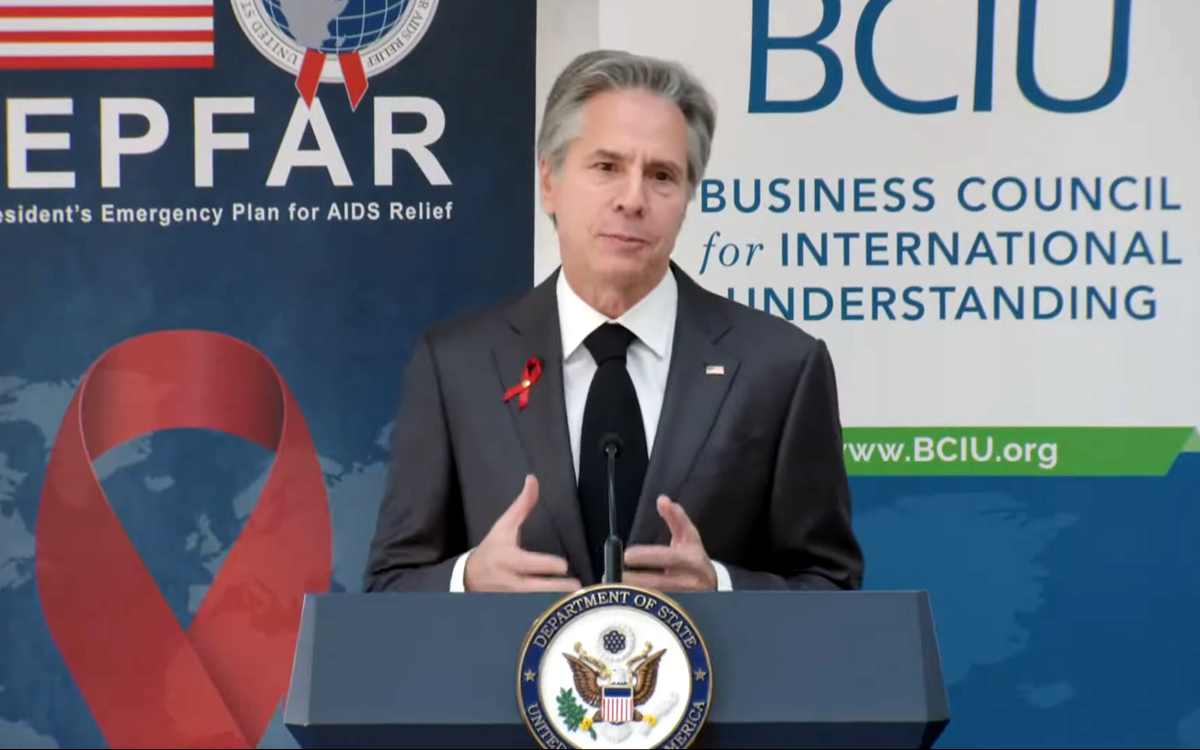
Stern is currently teaching at Columbia University’s School of International and Public Affairs, and is writing about her experience as the “first-ever human rights expert to be the special U.S. envoy for LGBTQI rights.” Stern also told the Blade that she is working to launch a new organization.
“I love being an activist again,” she said. “If there was ever a time when activists are needed, it’s now.”
“I am really proud to have rejoined the resistance,” added Stern.
-

 Movies2 days ago
Movies2 days agoSexy small town secrets surface in twisty French ‘Misericordia’
-

 Federal Government3 days ago
Federal Government3 days agoMass HHS layoffs include HIV/AIDS prevention, policy teams
-

 Maryland4 days ago
Maryland4 days agoAt transgender visibility celebration, Moore called out for lack of action
-

 Arts & Entertainment4 days ago
Arts & Entertainment4 days ago‘Think of those who have not been seen,’ Cynthia Erivo’s powerful message at GLAAD Awards

